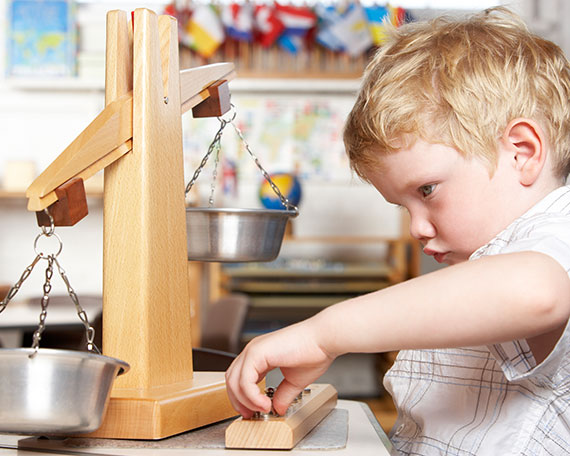It starts with respect
Montessori schools begin with a deep respect for children as unique individuals. They work from a deep concern for their social and emotional development.
Montessori schools are warm supportive communities of students, teachers, and parents. Children don’t get lost in the crowd!
Montessori schools consciously teach children to be kind and peaceful.
Fosters a learning environment
Montessori classrooms are bright, exciting environments for learning.
Montessori classes bring children together in multi-age groups, rather than classes comprised of just one grade level. Normally the classes span three age levels. Children stay with their teachers for three years. This allows teachers to develop close and long-term relationships with their pupils, allows them to know each child’s learning style, and encourages a strong sense of community among the children.
Every year more non-Montessori schools adopt this effective strategy.
Montessori classrooms are are not run by the teachers alone. Students are taught to manage their own community and develop leadership skills and independence.
Montessori assumes that children are born intelligent: they simply learn in different ways and progress at their own pace. The Montessori approach to education is consciously designed to recognize and address different learning styles, helping students learn to study most effectively. Students progress as they master new skills, moving ahead as quickly as they are ready.
Learning beyond the text-book
Montessori students rarely rely on texts and workbooks. Why? Because many of the skills and concepts that children learn are abstract, and texts simply don’t bring them to life. Also, in the case of reading, many reading series fail to collect first-rate and compelling stories and essays; instead,
Montessori relies upon hands on concrete learning materials and the library, where children are introduced to the best literature and reference materials.
Learning is not focused on rote drill and memorization. The goal is to develop students who really understand their school work.
Montessori students learn through hands-on experience, investigation, and research. They become actively engaged in their studies rather than passively waiting to be taught.
Challenges all children
Montessori challenges and sets high expectations for all students, not only those considered “gifted”.
Students develop self discipline and an internal sense of purpose and motivation. After graduation from Montessori, these values serve them well in high school, college, and throughout their lives.
Montessori schools normally reflect a highly diverse student body, and their curriculum promotes mutual respect and global perspective.
Learning beyond the classroom
Students develop a love for the natural world. Natural science and outdoor education are an important element of our children’s experience.
The Montessori curriculum is carefully structured among the different subject areas. Every class teaches critical thinking, composition, and research. History lessons link architecture, the arts, science, and technology.
Students learn to care about others through community service.
Montessori teachers facilitate learning, coach students along, and come to know them as friends and mentors.
Students learn not to be afraid of making mistakes; they come to see their mistakes as natural steps in the learning process.
Montessori students learn to collaborate and work together in learning and major projects. They strive for their personal best, rather than compete against one another for the highest grade in their class.

